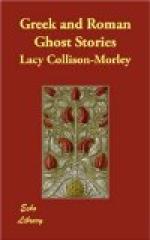In the opening of the Philopseudus, Lucian asks what it is that makes men so fond of a lie, and comments on their delight in romancing themselves, which is only equalled by the earnest attention with which they receive other people’s efforts in the same direction. Tychiades goes on to describe his visit to Eucrates, a distinguished philosopher, who was ill in bed. With him were a Stoic, a Peripatetic, a Pythagorean, a Platonist, and a doctor, who began to tell stories so absurd and abounding in such monstrous superstition that he ended by leaving them in disgust. None of us have, of course, ever been present at similar gatherings, where, after starting with the inevitable Glamis mystery, everybody in the room has set to work to outdo his neighbour in marvellous yarns, drawing on his imagination for additional material, and, like Eucrates, being ready to stake the lives of his children on his veracity.
Another scoffer was Democritus of Abdera, who was so firmly convinced of the non-existence of ghosts that he took up his abode in a tomb and lived there night and day for a long time. Classical ghosts seem to have affected black rather than white as their favourite colour. Among the features of the gruesome entertainments with which Domitian loved to terrify his Senators were handsome boys, who appeared naked with their bodies painted black, like ghosts, and performed a wild dance.[29] On the following day one of them was generally sent as a present to each Senator. Some boys in the neighbourhood wished to shake Democritus’s unbelief, so they dressed themselves in black with masks like skulls upon their heads and danced round the tomb where he lived. But, to their annoyance, he only put his head out and told them to go away and stop playing the fool.
The Greek and Roman stories hardly come up to the standards required by the Society for Psychical Research. They are purely popular, and the ghost is regarded as the deceased person, permitted or condemned by the powers of the lower world to hold communication with survivors on earth. Naturally, they were never submitted to critical inquiry, and there is no foreshadowing of any of the modern theories, that the phenomenon, if caused by the deceased, is not necessarily the deceased, though it may be an indication that “some kind of force is being exercised after death which is in some way connected with a person previously known on earth,” or that the apparitions may be purely local, or due entirely to subjective hallucination on the part of the person beholding them. Strangely enough, we rarely find any of those interesting cases, everywhere so well attested, of people appearing just about the time of their death to friends or relatives to whom they are particularly attached, or with whom they have made a compact that they will appear, should they die first, if it is possible. The classical instance of this is the well-known story of Lord Brougham who, while taking a warm bath in Sweden, saw a school




